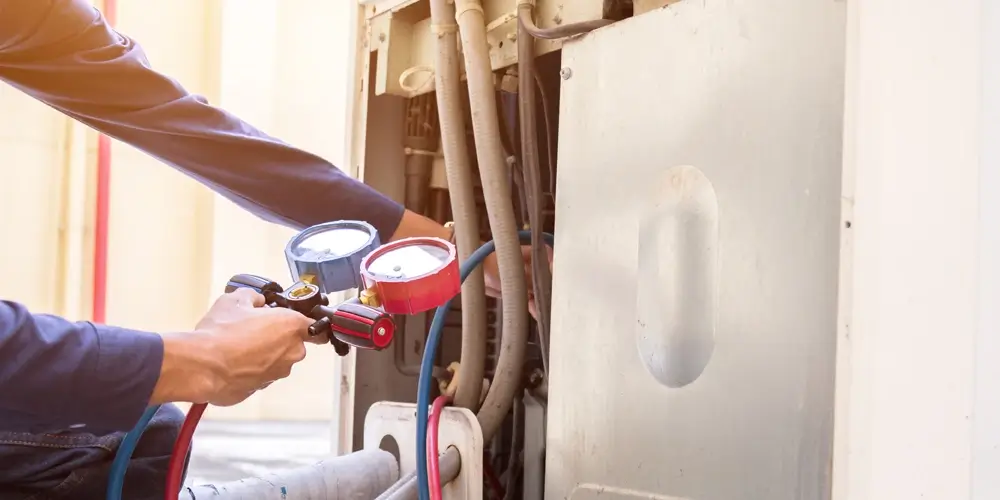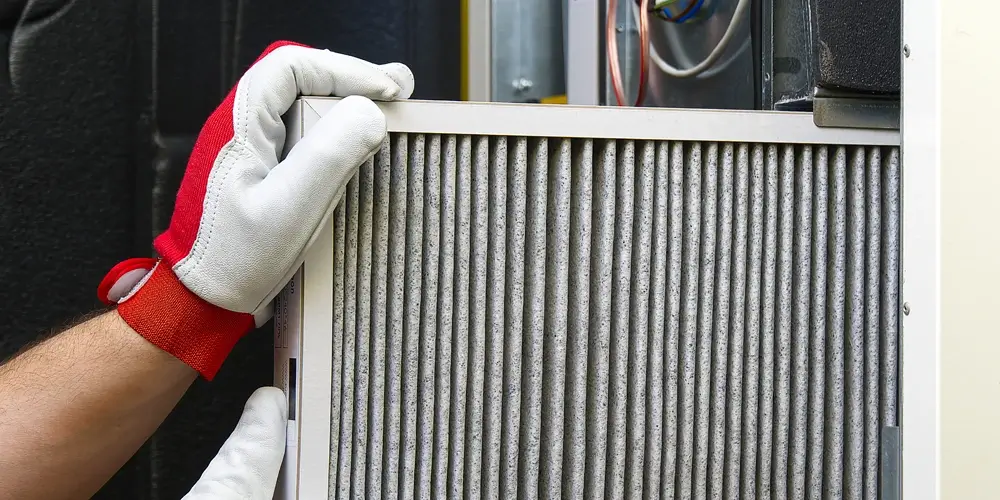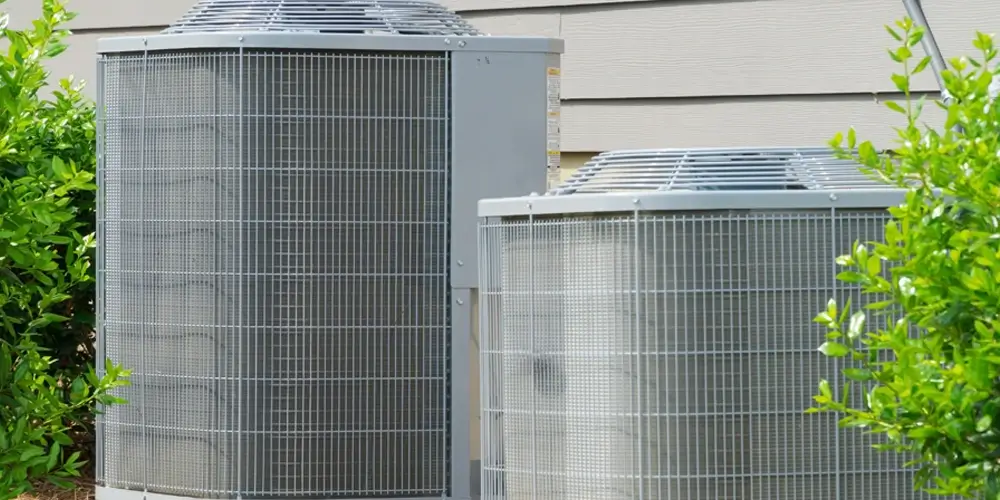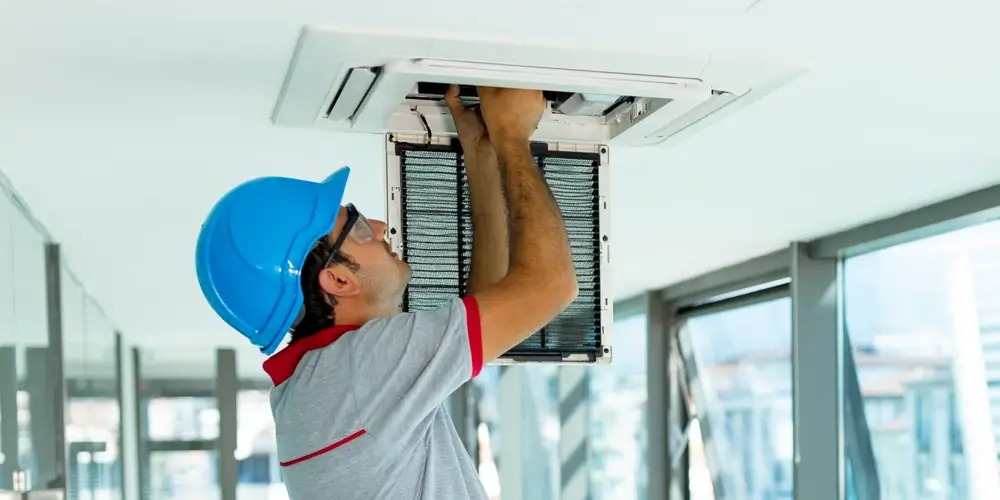Central Air Conditioning Installation & Repair

Our Air Conditioner Service
West Coast Chief Repair installs, repairs, and maintains all brands and types of air conditioners.
- All repairs come with a guarantee on labor and parts. We honor manufacturer warranties and will work with your insurance company.
- If your air conditioner needs a replacement, we’ll install a new unit for you. Warranties on new equipment vary by brand.
- Call us before noon for same-day service.
- We also do ductwork and can service your entire home HVAC system (heating, ventilation, and air conditioning).
- Estimates on new equipment installation are free.
What Is Central Air Conditioning?
Central air conditioning is a system in which air is cooled at a central location and distributed by one or more fans and ductwork.
A compressor circulates refrigerant through the air conditioner, removing heat from the air.
Blowers push cooled air back into the room, creating a comfortable environment.
Central air conditioning systems are more energy-efficient than individual units; they’re controlled by a single thermostat or several thermostats if you opt for a zone system.
Common Central AC Problems
Some of the more common problems with central air conditioners include:
Low refrigerant
If your air conditioner isn’t cooling as well as it used to, it may be low on refrigerant. Please don’t try to DIY this repair — it’s not like adding oil to your car engine! Have a qualified technician take a look.
Leaking refrigerant
If your air conditioner is leaking coolant, call us. A technician will pinpoint and repair the leak; adding more coolant may not solve an underlying problem with the compressor or another part of the cooling system. Naturally, your AC unit will need more refrigerant, but only after we fix the leak.
Faulty thermostat
The thermostat could be set incorrectly, or it may be defective. If you’ve checked the settings and your AC is still pumping out warm air or not working at all, call us. And if the thermostat is to blame, we’ll replace it with a smart thermostat that will save you wheelbarrows of money in reduced energy bills over the long, hot summer.
Dirty coils
Dirty coils decrease the efficiency of your air conditioner. Cleaning the coils is a relatively simple process that you can do yourself.
- First, turn off the power to the unit and remove the front panel.
- Use a soft brush or vacuum attachment to remove any dust or debris from the coils. Wash off caked-on grime with warm, soapy water or special AC coil cleaner from the hardware store.
- Be careful not to bend or damage the fins above the coils
Other problems
Other problems you may encounter less often include leaky air ducts, faulty compressors and condensers, defective electrical wiring, etc. If you suspect any of these things are hampering AC performance, call us. Trust the pros to do the work; don’t pin your hopes on a DIY YouTube video.
How Often Should You Service Your Central Air Conditioner?
It’s generally recommended that you have your central air conditioner serviced at least once a year, preferably in the spring, before you need to start using it regularly. This will help to ensure that it’s in good working condition and won’t break down when you need it most.

DIY AC Maintenance
Proper maintenance of your central air conditioner can prevent many problems and extend the life of your unit.
- Check your air filter and compressor often.
- Clean or replace your air filter each month to ensure air flows freely.
- Keep your compressor cabinet louvers clear of dirt, leaves, and other debris. A clogged compressor can become overheated and overworked, vulnerable to failure. A clogged compressor will also spike your energy bill!
- Keep your AC unit clear of plants, weeds, or other vegetation.
- You can improve the efficiency and longevity of your unit by having it installed in a shady area or sheltering it with overhead lattice panels, sunscreen fabric, or awnings.

DIY AC Maintenance
Proper maintenance of your central air conditioner can prevent many problems and extend the life of your unit.
- Check your air filter and compressor often.
- Clean or replace your air filter each month to ensure air flows freely.
- Keep your compressor cabinet louvers clear of dirt, leaves, and other debris. A clogged compressor can become overheated and overworked, vulnerable to failure. A clogged compressor will also spike your energy bill!
- Keep your AC unit clear of plants, weeds, or other vegetation.
- You can improve the efficiency and longevity of your unit by having it installed in a shady area or sheltering it with overhead lattice panels, sunscreen fabric, or awnings.
Expected Life of an Air Conditioner
New air conditioners can last from 15-20 years. Older models might last 10-12 years. Air conditioners placed outside are exposed to harsh elements, heat, and cold and have shorter lifespans than indoor units.
The day will come to bid farewell to your “coolest” friend, the trusty AC unit that has powered you through many toasty Los Angeles summers. The cost and nuisance of frequent repair will outweigh the expense of purchasing a new, energy-efficient air conditioning system.
Call us when that “aha moment” arrives. Ask about our financing options.
Central Air Conditioning Installation
Installing a central air conditioning system is a difficult job best reserved for specialists and not general handymen. Always hire a reputable company like West Coast Chief to install and replace your AC.
- AC units contain air handler components like evaporator coils, condensers, and compressors not found in most other appliances.
- Complex electrical circuitry must be considered.
- The installer should be familiar with local building codes, city permits, etc.
Trusting the job to a jack of all trades or attempting to do it yourself is only asking for trouble. Chief’s professional technicians:
- Are familiar with all major brands of air conditioning systems.
- Understand the various techniques of installation and troubleshooting.
- Are trained in AC installation, and they’re licensed, bonded, and insured.

Why Central Air Conditioning Is the Right Choice for Your Home
Window and wall AC units work well in apartments and condos, but they may not provide relief from the heat in larger homes.
Their cooling power is localized and limited, whereas cool air from a central air conditioning unit blows through ducting to the furthest corners of the house.
Smaller units may be attractive at first due to their lower purchase price and installation cost, but they’re a half-measure at best for the average home.
They tend to run constantly, driving up your electric bill. They may not reach bathrooms and some bedrooms. And they’re noisy! Just try relaxing in front of the TV with a wall air conditioner blasting 10 feet away.
Central Air Conditioning Is an Efficient Choice
A central cooling solution may be more affordable than you think.
- We offer free home evaluations and quality installation of all types and brands of central air conditioning.
- Installation usually requires only a couple of technicians and a few days’ work.
- Utility bill savings are significant over the alternatives.
- Financing is available to qualified customers.
We’ll help you choose the right equipment after performing a complete home evaluation to determine your energy profile.
We always recommend a central air unit the correct size for your home, and preferably with a high Seasonal Energy Efficiency Rating (SEER) if your budget allows it.
Size or cooling capacity is measured in tons. This doesn’t mean a 3-ton unit weighs 3 tons; it’s an indication of the air conditioner’s ability to cool large spaces.
The unit is based on the power it takes to melt a ton of ice in 24 hours. So a 3-ton air conditioner has the same cooling power as the energy it takes to melt 3 tons of ice in a day.
A too-small unit will run continually without cooling effectively, providing little comfort and driving up your energy bills.
A too-large unit will cool your home faster but will shut down before it reduces air humidity. This will leave you feeling clammy and uncomfortable; plus, moisture buildup can damage your air conditioner.
More Than One Option: Types of Central Air Conditioners
Split AC Systems
Split systems are set up in a dual array where the condenser coil, evaporator coil, and compressor are split between locations in the home and the metal case outside.
This is usually the preferred configuration, as most other arrangements are compromises to overcome obstacles.
With split air conditioning, the components that expel heat stay outside, and the cooling apparatus is housed inside.
Cool air stays where needed, and heat is kept at bay.
Packaged AC Systems
Packaged central air conditioners have the evaporator, condenser, and compressor combined or “packaged” in a single unit.
Due to their compact size, packaged units are ideal for apartments and small houses. They’re often used in small commercial buildings because the unit can be placed on a concrete slab near the foundation or kept on the roof.
A packaged air conditioner can be linked with heating coils or tied to a natural gas furnace to heat the building on colder days, serving as a de facto HVAC system.
Ductless Mini-Split AC
In most modern houses, ducting is a standard as plumbing.
However, in older homes, ducting may be impractical, unsightly, or prohibitively expensive to install.
The practical workaround is to pump refrigerant to individual blower units placed in strategic locations around the building. Circulated refrigerant can travel through small pipes that take up much less space than ductwork.
This configuration offers benefits similar to strictly central air conditioning without being a central AC system in a strict sense.
Trust West Coast Chief with Your AC Installation, Service & Repair
Don’t gamble on a fly-by-night operation when it comes to your air conditioning.
West Coast Chief Repair has serviced the Los Angeles and Orange County communities for over three decades. We’re fully licensed and insured and have an A+ rating with the Better Business Bureau.
We offer free estimates on new installations and flat-rate pricing on repairs. Our team of highly trained technicians is standing by to serve you.
Schedule a free evaluation today to see what we can do for you.
